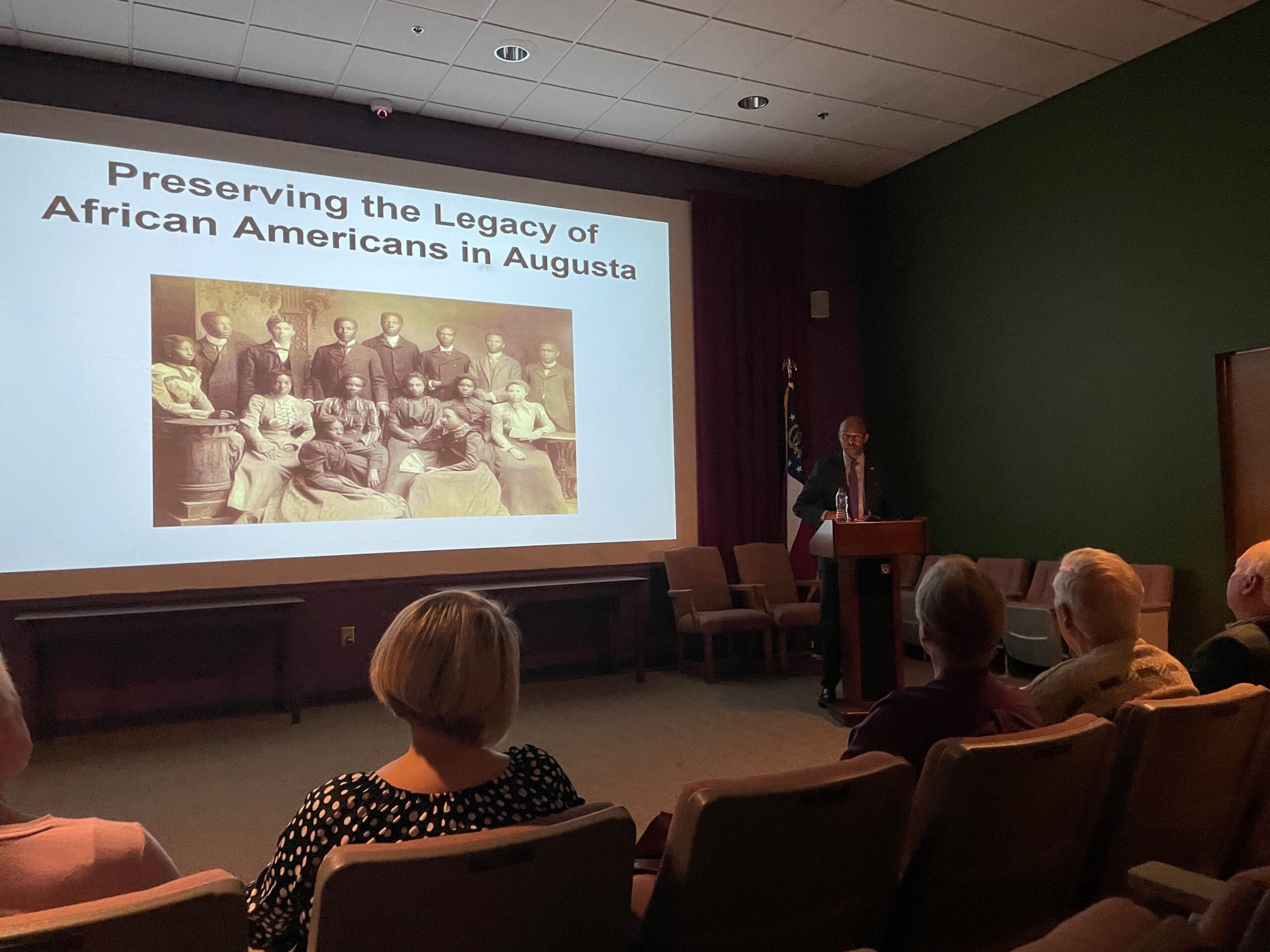In this year’s second installment in the Augusta Museum of History’s annual Brown Bag Lecture series, Dr. Bobby Donaldson, director of the Center for Civil Rights History and Research at the University of South Carolina, began his presentation, “The Completion of Springfield Village Park,” invoking by invoking scripture.
“The story of Springfield Village Park is Hebrews 11:1, the substance of things hoped for, and mighty evidence of things not seen,” said Donaldson, an Augusta native, John S. Davidson Fine Arts Magnet School alum and the son of a Baptist preacher. “It’s been 20 years in the making for this project.”
The historian’s lecture discussed the legacy of Springfield Village Park on 1200 Reynolds St. downtown, built in 2002 to commemorate the adjacent Springfield Baptist Church, built in 1801. In doing so, Donaldson surveyed African American history in the Garden City.
“Those who have memories of those early decades know that across from Springfield, at that time was the most unsightly area of the city,” he said. “No one could envision that on that very block you might have a public city park, on which you will have history replayed.”
Donaldson went on to recognize historian and scholar Carter G. Woodson, who founded the Association for the Study of Negro Life and History, (now called the Study of African American Life and History or ASALH), as well as “The Journal of Negro History” founded in 1916, and in 1926, launched “Negro History Week,” the celebration that would evolve into Black History Month.
MORE: Local school counties celebrate progress on JA Discovery Center
“But what’s important about Woodson is he was not alone,” Donaldson said, gradually bringing forth a connection to Augusta by mentioning educator and civil rights activist Mary McLeod Bethune, who was one of the earliest presidents of ASALH.
Near the end of the 19th century, a young Bethune became a faculty member at the Haines Normal and Industrial Institute, which would later take the namesake of its founder and become Lucy Craft Laney High School. By 1930, Bethune would go on to found what would become Bethune-Cookman University in Daytona Beach, Fla.
“[McLeod Bethune] credits Lucy Craft Laney with shaping her career,” said Donaldson.
The lecture went on to bring up the book “Old Springfield: Race and Religion in Augusta,” by Edward J. Cashin, which draws from local and state archives, marriage and baptismal records, church photographs, ledgers and African American newspapers.
One such newspaper was “The Georgia Baptist,” launched and edited by minister and activist William Jefferson White. White was a resident of the Springfield Village neighborhood and also went on to found the Augusta Institute in 1867, which would become Morehouse College in Atlanta.
White would invite Frederick Douglass to Augusta in 1888, in one of many letter correspondences the influential abolitionist would have with Augustans. When Douglass arrived from Charleston, he spoke before a congregation at Springfield.
“Part of why he is here in 1888 is that he is here to do research about the arc of time from reconstruction to the mid-1880s and what changes transpired,” said Donaldson. “What he’s trying to do is chronicle efforts to undermine African American voting power. He is here to investigate efforts to weaken African American education and landholdings.”
MORE: Choice of candidates set for Richmond County school board, Blythe elections
Donaldson recalled one of his inspirations toward studying history: reading, as a W.S. Hornsby Elementary School student, “Historic Augusta for Kids” by fellow Augusta historian Leann Caldwell, who presented the initial Brown Bag Lecture for 2023, and was present in the audience at Donaldson’s presentation.
“My very first visit to Springville, aside from going to the church as a kid on a tour, was this book,” he said.
Caldwell’s book, he said, was one of the first publications to acknowledge African Americans’ contributions to Augusta. Further research, however, would go on to fill the gaps in history by showing how African Americans in Augusta told their own stories.
“What we have in Augusta at that intersection of Reynolds and 12th is a national treasure,” said Donaldson. “In this space, visitors, students and citizens are exposed to a history that reminds us that that intersection is the birthplace of African American freedom, religion, and education. It’s not just a park, it’s a classroom that’s open all day, every day.”
Skyler Q. Andrews is a staff reporter covering business for The Augusta Press. Reach him at skyler@theaugustapress.com.










